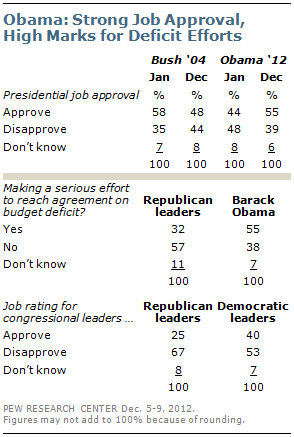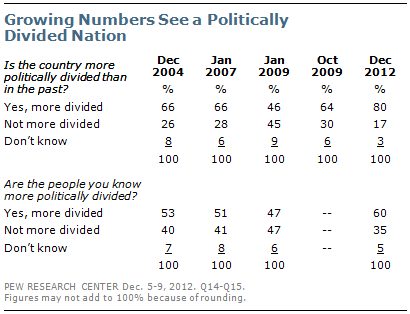Overview
The Democrats are in a strong position with the public as they engage in negotiations to find a solution to the fiscal cliff crisis. Barack Obama’s first post-reelection job approval rating has

risen to 55%, up five points since July and 11 points since the start of the year. Obama’s job rating is markedly higher than George W. Bush’s first job measure (48%) after he won reelection in 2004.
When it comes to the reaching an agreement to avoid the fiscal cliff, 55% say Obama is making a serious effort to work with Republicans. But just 32% say Republican leaders are making a serious effort to work with Obama on a deficit deal.
The latest national survey by the Pew Research Center for the People & the Press, conducted Dec. 5-9 among 1,503 adults, finds that the current problems for the GOP run deep. Just 25% approve of the way Republican leaders in Congress are doing their jobs, while 40% approve of Democratic leaders’ job performance. And the GOP’s lead negotiator, House Speaker John Boehner, is viewed more unfavorably (40%) than favorably (28%).
By a 53% to 33% margin, the public sees the Republican Party, rather than the Democratic Party, as “more extreme in its positions.” Democrats, on the other hand, are seen as “more willing to work with leaders from the other party” by roughly two-to-one (53% vs. 27%).
Americans have long felt that deficit reduction should be achieved with a combination of spending cuts and tax increases, and as the debate intensifies, this consensus is only growing. Nearly three-quarters (74%) say the best way to reduce the deficit is by both cutting major programs and increasing taxes, up from 69% in September and just 60% in July 2011 when the debate focused on raising the debt ceiling. Just 11% say the focus should mostly be on program cuts and 7% say the focus should be mostly on tax increases.

However, while the public endorses a balanced approach to deficit reduction, majorities continue to oppose making cuts in federal funding for several specific programs, including education (77% disapprove), roads and transportation (67%), programs to aid low-income Americans (58%) and military defense (55%). And majorities also disapprove of gradually raising the retirement age for Medicare and Social Security (56% each).
In fact, the only deficit reduction proposals that garner more support than opposition – among 12 items tested – are those that affect higher income Americans, either directly or indirectly. Of the 12, by far the most widely supported option is raising taxes on incomes over $250,000; fully 69% approve of that proposal. Narrow majorities also favor limiting the deductions a taxpayer can claim (54% approve) and raising the tax rate on investment income (52%).
There is more support for an overall cap on tax deductions than for a limit on the tax deduction for home mortgage interest: opinion runs against limiting the mortgage deduction (41% approve, 52% disapprove), but in favor of a more general deduction limit as some have proposed (54% approve, 40% disapprove).
While the nation’s budget deficit may be the focus in Washington, the public continues to view the job situation as the most worrisome national economic issue. Four-in-ten (40%) say the job situation is the top economic worry, while 25% say the federal budget deficit. These views have changed little since March.
Although the public expresses doubts about the Republican Party’s leadership and approach to the current discussion, the GOP still engenders about as much confidence as the Democrats on the public’s top two economic worries – jobs and the deficit. But

Democrats hold significant leads on all other domestic issues tested, including education, energy, health care and Social Security, as well as being seen as the party better able to manage the federal government by a 45% to 36% margin.
And there has been no improvement in the Republican Party’s image over the past year. The job approval rating of Republican congressional leaders, which fell to just 22% in August of 2011 after the debt ceiling debate, stands virtually unchanged at 25% today. Meanwhile, the job rating for both Democratic leaders in Congress (now 40% up from 29% in August 2011) and Obama (55% up from 43%) have rebounded by double-digits.
The recovery in Obama’s job approval ratings is particularly notable; other than a brief spike following the killing of Osama bin Laden, Obama’s approval has not been significantly above 50% since September of his first year in office.

And this corresponds with a less sour assessment of the economy. While few say the economy is in good shape, the number describing economic conditions as poor stands at 35%, the lowest since January 2008. And while only 22% believe that plenty of jobs are available, that is up from 10% in early 2010, and the highest since 2008. However, while current conditions appear slightly better, expectations for the future have taken a turn for the worse. The share who think economic conditions will be worse a year from now has risen to 25%, a four year high.
Partisanship is a factor in the changing views of the economy, particularly the public’s less positive economic outlook. Republicans, who no doubt were stung by Obama’s victory last month and are deeply pessimistic about progress toward a deal to avoid the fiscal cliff, have an increasingly negative economic outlook.

Nearly half of Republicans (47%) say the economy will be worse a year from now than it is today. In January, just 19% expected national conditions to worsen. Economic expectations among Democrats and independents are little changed from the start of this year.
A Pew Research Center/Washington Post poll last week found that 69% of Republicans said Obama and congressional Republicans will not reach a budget agreement by the Jan.1 deadline. By contrast, most Democrats (55%) predicted that the two sides would be able to reach an agreement in time.
Republicans’ deepening gloom – about the economy and the fiscal cliff – appears to have colored their overall expectations for the coming year. Fully 69% say 2013 will be worse than 2012; that compares with just 9% of Democrats and 38% of independents. Last January, just 37% of Republicans said the year ahead would be worse than the year that had just passed.

Meanwhile, there has been an across the board rise in the number saying that the country is more politically divided than it was in the past. Currently, 80% view the country as more politically divided – the highest percentage ever in a Pew Research Center survey. Nearly identical percentages of Democrats (82%), Republicans (81%) and independents (80%) say the country is more politically divided.
And 60% now say the people they know also are more politically divided. That is higher than the percentages saying this shortly after Obama first won the presidency (47% in January 2009) and Bush won his second term (53% in December 2004). In the current survey, majorities of Republicans (67%), independents (60%) and Democrats (58%) say the people they know are more divided over politics than in the past.
Other Findings
Military’s Ratings Still Strong. Favorable ratings for the military – and military leaders – remain strong despite the recent scandal involving former Gen. David Petraeus. More than eight-in-ten (83%) express a favorable opinion of the military while 71% have a favorable view of military leaders. Both measures are little changed from past years.
Views of Supreme Court Still Divided. The partisan differences in opinions about the Supreme Court that emerged after its ruling on the 2010 health care law remain evident. About six-in-ten Democrats (62%) have a favorable opinion of the court, compared with 44% of Republicans. In April, before its July ruling upholding most of the law, there were no significant differences in views of the court.
Mixed Awareness of Fiscal Cliff. A majority (57%) knows that the fiscal cliff involves automatic spending cuts and tax increases and 70% know that nearly all taxpayers – not just those with high incomes – would be affected. But just 38% know that if the spending cuts go into effect, the military would be most affected.